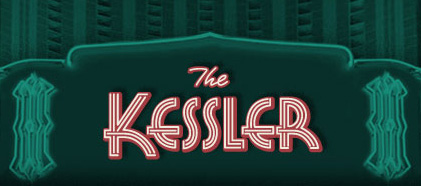Upcoming Events
|
Sat
21
FEB
|
7:00pm
|
 |
The Kessler
-
Dallas
TX
Daniel Donato’s Cosmic Country
Daniel Donato
|
|
Mon
23
FEB
|
7:00pm
|
 |
The Kessler
-
Dallas
TX
Warren Haynes Solo - Winter of Warren 2026
Warren Haynes
|
|
Fri
27
FEB
|
7:00pm
|
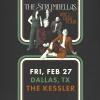 |
The Kessler
-
Dallas
TX
The Strumbellas: Into Dust Tour with special guest Sam Burchfield
The Strumbellas, Sam Burchfield
|
|
Wed
4
MAR
|
7:00pm
|
 |
The Kessler
-
Dallas
TX
West Texas Exiles and J Isaiah Evans & the Boss Tweed
West Texas Exiles, J Isaiah Evans & the Boss Tweed
|
|
Thu
5
MAR
|
7:00pm
|
 |
The Kessler
-
Dallas
TX
Magic City Hippies with special guest Supertaste
Magic City Hippies, Supertaste
|
|
Fri
6
MAR
|
6:30pm
|
 |
The Kessler
-
Dallas
TX
Bob Schneider - Early Show
Bob Schneider
|
|
Fri
6
MAR
|
9:15pm
|
 |
The Kessler
-
Dallas
TX
Bob Schneider - Late Show
Bob Schneider
|
|
Sat
7
MAR
|
7:00pm
|
 |
The Kessler
-
Dallas
TX
The Deathray Davies with special guest Helium Queens and Buttercup
The Deathray Davies, Helium Queens, Buttercup
|
|
Wed
11
MAR
|
7:00pm
|
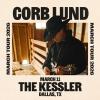 |
The Kessler
-
Dallas
TX
Corb Lund with special guest Branson Anderson
Corb Lund, Branson Anderson
|
|
Sat
14
MAR
|
7:00pm
|
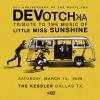 |
The Kessler
-
Dallas
TX
KXT 91.7 presents DeVotchKa - A Tribute to the Music of Little Miss Sunshine
Devotchka
|
|
Sun
15
MAR
|
7:00pm
|
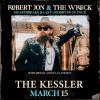 |
The Kessler
-
Dallas
TX
Robert Jon & the Wreck with special guest Sam Morrow
Robert Jon & the Wreck, Sam Morrow
|
|
Wed
18
MAR
|
7:00pm
|
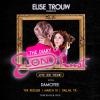 |
The Kessler
-
Dallas
TX
Elise Trouw presents: The Diary of Elon Lust Tour
Elise Trouw, Damoyee
|
|
Fri
20
MAR
|
7:00pm
|
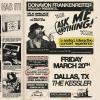 |
The Kessler
-
Dallas
TX
Donavon Frankenreiter with special guests Hendrix Frankenreiter and The Sunday Spins
Donavon Frankenreiter, Hendrix Frankenreiter, The Sunday Spins
|
|
Sat
21
MAR
|
7:00pm
|
 |
The Kessler
-
Dallas
TX
Texas Blues Guitar Summit
Texas Blues Guitar Summit, Anson Funderburgh, Mike Morgan, Shawn Pittman
|
|
Tue
24
MAR
|
7:00pm
|
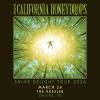 |
The Kessler
-
Dallas
TX
The California Honeydrops - Shine Delights Tour 2026 - NOW AT THE KESSLER
The California Honeydrops
|
|
Thu
26
MAR
|
7:00pm
|
 |
The Kessler
-
Dallas
TX
Wild Child with special guest Certainly So and Motanko
Wild Child, Certainly So, Motanko
|
|
Fri
27
MAR
|
7:00pm
|
 |
The Kessler
-
Dallas
TX
Jonah Kagen with special guest Jack Barksdale
Jonah Kagen, Jack Barksdale
|
|
Sat
28
MAR
|
7:00pm
|
 |
The Kessler
-
Dallas
TX
The Wood Brothers
|
|
Wed
1
APR
|
7:00pm
|
 |
The Kessler
-
Dallas
TX
Paul Cauthen
|
|
Thu
2
APR
|
7:00pm
|
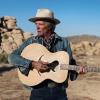 |
The Kessler
-
Dallas
TX
Charlie Sexton
|
|
Fri
3
APR
|
7:00pm
|
 |
The Kessler
-
Dallas
TX
Alejandro Escovedo & The Electric Saints
Alejandro Escovedo
|
|
Sat
4
APR
|
7:00pm
|
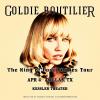 |
The Kessler
-
Dallas
TX
Goldie Boutilier with special guest Syd Taylor
Goldie Boutilier, Syd Taylor
|
|
Sat
11
APR
|
7:00pm
|
 |
The Kessler
-
Dallas
TX
Stories & Songs: An Evening with Radney Foster & Kelly Willis
Kelly Willis, Radney Foster
|
|
Sun
12
APR
|
7:00pm
|
 |
The Kessler
-
Dallas
TX
Off Book - The Improvised Musical
Off Book the Improvised Musical
|
|
Thu
16
APR
|
7:00pm
|
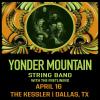 |
The Kessler
-
Dallas
TX
Yonder Mountain String Band with special guest The Fretliners
Yonder Mountain String Band, The Fretliners
|
|
Sat
18
APR
|
7:00pm
|
 |
Majestic Theatre
-
Dallas
TX
An Evening with Colin Hay
Colin Hay
|
|
Sat
25
APR
|
7:00pm
|
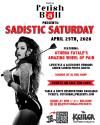 |
The Kessler
-
Dallas
TX
FETISH BALL PRESENTS: SADISTIC SATURDAY
Athena Fatale
|
|
Sat
2
MAY
|
7:00pm
|
 |
The Kessler
-
Dallas
TX
Madam Radar and Paul McDonald
Madam Radar, Paul Mcdonald
|
|
Wed
6
MAY
|
7:00pm
|
 |
The Kessler
-
Dallas
TX
Mike Doughty - Solo Tour '26
Mike Doughty
|
|
Wed
13
MAY
|
6:30pm
|
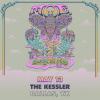 |
The Kessler
-
Dallas
TX
moe. - Born to Fly Tour
moe.
|
|
Wed
13
MAY
|
6:30pm
|
 |
Winspear Opera House
-
Dallas
TX
Drew & Ellie Holcomb
|
|
Thu
14
MAY
|
7:00pm
|
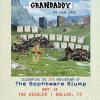 |
The Kessler
-
Dallas
TX
Grandaddy – 25th Anniversary of Sophtware Slump
Grandaddy
|
|
Fri
15
MAY
|
7:00pm
|
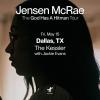 |
The Kessler
-
Dallas
TX
Jensen McRae - God Has A Hitman Tour
Jensen Mcrae, Jackie Evans
|
|
Sat
16
MAY
|
7:00pm
|
 |
The Kessler
-
Dallas
TX
The New Pornographers with special guest Will Sheff (of Okkervil River)
The New Pornographers, Will Sheff (of Okkervil River)
|
|
Sat
30
MAY
|
7:00pm
|
 |
The Kessler
-
Dallas
TX
Lisa Morales and Los Texmaniacs
Los Texmaniacs, Lisa Morales
|
|
Fri
5
JUN
|
7:00pm
|
 |
The Kessler
-
Dallas
TX
Melissa Carper and Jaime Wyatt
Melissa Carper, Jaime Wyatt
|
|
Sat
6
JUN
|
7:00pm
|
 |
The Kessler
-
Dallas
TX
Little Image
|
|
Fri
12
JUN
|
7:00pm
|
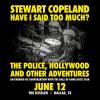 |
The Kessler
-
Dallas
TX
Stewart Copeland - Have I Said Too Much
Stewart Copeland
|
|
Sat
13
JUN
|
7:00pm
|
 |
The Kessler
-
Dallas
TX
Ian Moore Vinyl Release - 30th Anniversary of Modern Day Folklore
Ian Moore
|
|
Sun
21
JUN
|
7:00pm
|
 |
The Kessler
-
Dallas
TX
Troy Doherty
|

